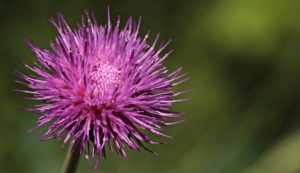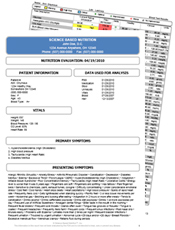Silymarin is the active component of the herbal plant known as milk Thistle. It has been used for centuries for various diseases to include liver disorders, gastrointestinal disorders, digestion, and has also been indicated in various illnesses of different organs such as prostate, lungs, CNS, kidneys, pancreas, and skin1. Silymarin can suppress inflammation of cells in the body similar to ways that exercise can help coordinate the response of stressors. The results of the anti-inflammatory pathways that silymarin can signal leads to cellular repair and maintenance2.
diseases to include liver disorders, gastrointestinal disorders, digestion, and has also been indicated in various illnesses of different organs such as prostate, lungs, CNS, kidneys, pancreas, and skin1. Silymarin can suppress inflammation of cells in the body similar to ways that exercise can help coordinate the response of stressors. The results of the anti-inflammatory pathways that silymarin can signal leads to cellular repair and maintenance2.
Properties of Silymarin include:
- Reduces inflammation
- Acts as an antioxidant reducing free radicals
- Stimulating the production of new liver cells
- Reduce the toxic effects of chemical exposures
Silymarin has been used to treat a range of disorders and is considered safe and well-tolerated. The most common use of silymarin is for the liver. If the liver if functioning poorly, so is almost everything else in the body.
Hepatitis Studies
Hepatitis is inflammation of the liver. It can be temporary and resolve on its own or can become long term and progress to a disorder more severe or even cancer. Symptoms of hepatitis also range from nothing at all to discoloration of the skin, diarrhea, abdominal pain, and more.
The results of clinical trial published in a study indicates that 82% of the patients with acute hepatitis who received 140mg of silymarin three times a day for at least 3 weeks showed improved levels of AST (SGOT) liver blood test. The bilirubin blood test also improved in 40% of these patients3. The conclusion of these trials indicated that therapy with silymarin reduces complications, reduces the duration of hospital stay and promotes recovery3. In more advanced cases of liver inflammation where studies were done on patients who had a positive biopsy for cirrhosis, patients who took silymarin had improved survival rate after 4 years4.
In another study, patients with alcohol related liver disease were treated with silymarin at a dosage of 420 mg per day for 4 weeks. At the end of the study, the liver blood test AST went down by 30.1% and ALT dropped by 40.8%5. In the same study, the liver enzymes increased when patients that did not take the silymarin.
The anti-oxidant anti-inflammatory properties of Silymarin have been widely studied. Use of silymarin can be beneficial to detoxify the liver, improve fatty liver caused by alcohol use, protect the liver from viruses and use of drugs or medications.
Diabetes and cholesterol
Excessive amounts of LDL Cholesterol can increase your risk of developing atherosclerosis, or plaque build-up in the arteries. In a diseased state, inflammation occurs at a cellular level causing reactions that accelerate injury to the arterial wall increasing your risk for cardiovascular disease. Foods known to accelerate this are7:
- High-fructose corn syrup
- Soda
- Fortified white flour
- Caffeine
- Corn, soy and safflower oil
- Margarine and shortening
- Hydrogenated fats
Milk thistle and its antioxidant properties from silymarin, has been a promising herb to show benefits on the cardiovascular system and reducing inflammation. Researchers have shown that a milk thistle extract can prevent cholesterol oxidation by over 85 percent7. Be sure to keep in mind that, along with taking beneficial antioxidants and vitamins, a healthy diet and exercise are all a part of preventing cardiovascular disease and other metabolic disorders.
Studies have been done to determine to the effects of silymarin on patients that have Type II Diabetes. Silymarin is known to have antioxidant properties on the glycemic profile in diabetic patients. One study found significant reductions in Hemoglobin A1C levels, fasting blood glucose, insulin, liver enzymes SGOT and SGPT, and LDL Cholesterol of patients with Type II Diabetes after taking silymarin at a dose of 200 mg three times a day.6
Protection against cancer
Along with other potent antioxidants like Vitamin E and Vitamin C, silymarin can help fight cellular damage and prevent against disease progression by increasing the functioning of the immune system. Silymarin can help counteract the effects of chemical exposures, pollutants and heavy metals we are exposed to on a daily basis. There is strong preclinical evidence for silymarin’s protective properties for the liver and anticarcinogenic effects, including inhibition of cancer cell growth in human prostate, skin, breast, and cervical cells.8
While much more research is needed in the field regarding silymarin benefits on patients with cancer, many laboratory studies that have already been done are promising. One study showed that the effects of silymarin on breast cancer cells inhibits the cells’ growth and induces their death. The study concluded that silymarin might be “an effective adjuvant drug to produce a better preventive response for the cancer therapy9.”
Another published study done by the Univerisity of Colorado Cancer Center focused more on prostate cancer growth and metastasis. Researchers found that the compounds derived from milk can restrict the tumors’ ability to grow new blood vessels they need for survival10. Without the ability to grow new blood vessels, a tumor cannot grow.
There’s more to it than just milk thistle
If you think you or someone you know would benefit from using silymarin, then there is a very high probability that there is more to look at. Taking silymarin along with some medications that are broken down by the liver can increase the effects and side effects of some medications. It is important to seek guidance by an experienced nutritionist to get tested properly. A comprehensive blood analysis and hair tissue test can be analyzed to determine the exact needs of your body. It is important to note that dietary recommendations and supplement guidelines based on testing results will vary from person to person. The research mentioned above is to give you an idea what the benefits are of just taking one supplement. Imagine if you were to discover all deficiencies and/or toxicities that you have and were able to determine what other vitamins and minerals you needed. The road towards optimal health is right in front of you. Don’t wait, get started today!
Words Cited
- Gazak R, Walterova D, Kren V. Silybin and silymarin – New and emerging applications in medicine. Curr Med Chem. 2007;14:315–338.
- Natural Medicine Journal December 2012 Vol. 4 Issue 12
- Flora K, Hahn M, Rosen H, et al. Milk thistle (Silybum marianum) for the therapy of liver disease. Am J Gastroenterol 1998; 93: 139-43
- Ferenci P, Dragosics B, Dittrich H, et al. Randomized controlled trial of silymarin treatment in patients with cirrhosis of the liver. J Hepatol 1989; 9: 105-13
- Salmi HA, Sarna S. Effect of silymarin on chemical, functional, and morphological alterations of the liver. Scand J Gastroenterol 1981; 17: 517-21
- Huseini, H F, et al. “The Efficacy of Silybum Marianum (L.) Gaertn. (Silymarin) in the Treatment of Type II Diabetes: a Randomized, Double-Blind, Placebo-Controlled, Clinical Trial.” Phytotherapy Research: PTR., U.S. National Library of Medicine, Dec. 2006,
- Wallace, Sunny, et al. “Milk Thistle Extracts Inhibit the Oxidation of Low-Density Lipoprotein (LDL) and Subsequent Scavenger Receptor-Dependent Monocyte Adhesion”J. Agric. Food Chem., 2008, 56 (11), pp 3966–3972
- Post-White, J. et al. “Advances in the use of milk thistle (Silybum marianum).” Integr Cancer Ther. 2007 Jun;6(2):104-9.
- Bien, Monica. “Milk Thistle and Breast Cancer: What You Should Know.” Healthline, Healthline Media, 14 Jan. 2016, www.healthline.com/health/milk-thistle-and-breast- cancer#2.

